15 start with M start with M
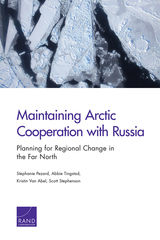
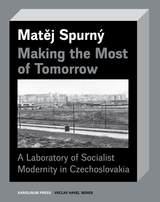
In this book, Matěj Spurný explores the historical city of Most from the nineteenth century into the years following World War II, investigating the decision to destroy it as well as the negotiations concerning the spirit of the proposed new city. Situating postwar Most in the context of cultural and social shifts in Czechoslovakia and Europe as a whole, Spurný traces the path a medieval city took to become a showcase of brutalist architecture and the regime’s technicist inhumanity.
But the book, like the city of Most itself, does not end in tragedy. Fusing architectural and political history with urban and environmental studies, Spurný’s tale shows the progress that can be made when Czechs confront the crimes of the past—including the expulsion of local Germans and the treatment of the Romani minority—and engage with rational, contemporary European concepts of urban renewal.
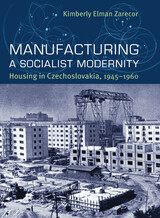
Eastern European prefabricated housing blocks are often vilified as the visible manifestations of everything that was wrong with state socialism. For many inside and outside the region, the uniformity of these buildings became symbols of the dullness and drudgery of everyday life. Manufacturing a Socialist Modernity complicates this common perception. Analyzing the cultural, intellectual, and professional debates surrounding the construction of mass housing in early postwar Czechoslovakia, Zarecor shows that these housing blocks served an essential function in the planned economy and reflected an interwar aesthetic, derived from constructivism and functionalism, that carried forward into the 1950s.
With a focus on prefabricated and standardized housing built from 1945 to 1960, Zarecor offers broad and innovative insights into the country’s transition from capitalism to state socialism. She demonstrates that during this shift, architects and engineers consistently strove to meet the needs of Czechs and Slovaks despite challenging economic conditions, a lack of material resources, and manufacturing and technological limitations. In the process, architects were asked to put aside their individual creative aspirations and transform themselves into technicians and industrial producers.
Manufacturing a Socialist Modernity is the first comprehensive history of architectural practice and the emergence of prefabricated housing in the Eastern Bloc. Through discussions of individual architects and projects, as well as building typologies, professional associations, and institutional organization, it opens a rare window into the cultural and economic life of Eastern Europe during the early postwar period.
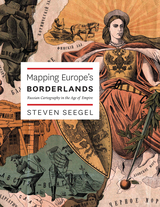
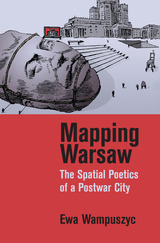
Juxtaposing close readings of photo books, socialist-era newsreels called the Polska Kronika Filmowa, the comedies of Leonard Buczkowski and Jan Fethke, the writing and films of Tadeusz Konwicki, and a case study on the Palace of Culture and Science—a "gift" from none other than Stalin—this study investigates the rhetorical and visual, rather than physical, reconstruction of Warsaw in various medias and genres.
Ewa Wampuszyc roots her analysis in the historical context of the postwar decade and shows how and why Poland's capital became an essential part of a propaganda program inspired by communist ideology and the needs of a newly established socialist People's Republic. Mapping Warsaw demonstrates how physical space manifests itself in culture, and how culture, history, and politics leave an indelible mark on places. It points out ways in which we take for granted our perception of space and the meanings we assign to it.
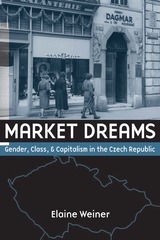
Drawing on a rich trove of focus group data, interviews, and textual sources, Elaine Weiner's Market Dreams powerfully captures the varied responses of female managers and factory workers in the Czech Republic to their country's transition from socialism to capitalism. Her work, rooted in sociology and comparative feminism, is an important advance for the literature on women in Eastern Europe.
"Market Dreams is a conceptually-sophisticated and empirically-rich account of how the discourses and practices of the free market penetrated the hearts and minds of everyday Czech citizens. Weiner's provocative analysis takes readers inside the worlds of female factory workers to expose the discontinuities between their radiant market dreams and their everyday realities--and juxtaposes them to the continuities experienced by female managers. In the process, it challenges many of our ideas about post/socialism, marketization, and gender and reveals the enduring power of stories in shaping social identities and actions."
---Lynne Haney, Associate Professor of Sociology, New York University
"Through interviews and a careful analysis of newspaper articles written in the first decade after the collapse of state socialism, Weiner explores the complicated interconnections between personal stories and the emerging neoliberal metanarrative of the free market in the Czech Republic after 1989. Her book transcends many of the dichotomies with which researchers of post-state socialism have been struggling: 'East' vs. 'West,' losers and winners, emancipation vs. oppression, etc., and thus makes a truly novel contribution to our understanding of women's lives after state socialism."
---Éva Fodor, Assistant Professor of Gender Studies, Central European University
"Weiner's rich and innovative study of female Czech managers and workers exemplifies the importance of narrative analysis for understanding why gender and class have not (yet) reconfigured the sense of postcommunism's alternatives. This is critical reading for feminists, class analysts, and students of postcommunist social change."
---Michael Kennedy, Director, Center for European Studies, University of Michigan
Elaine Weiner is Assistant Professor of Sociology at McGill University. Visit the author's website at: www.mcgill.ca/sociology/faculty/weiner/.
Cover Credit: Frank Scherschel/Time & Life Pictures/Getty Images

Materializing Magic Power paints a broad picture of the dynamics of popular religion in Taiwan. The first book to explore contemporary Chinese popular religion from its cultural, social, and material perspectives, it analyzes these aspects of religious practice in a unified framework and traces their transformation as adherents move from villages to cities.
In this groundbreaking study, Wei-Ping Lin offers a fresh perspective on the divine power of Chinese deities as revealed in two important material forms—god statues and spirit mediums. By examining the significance of these religious manifestations, Lin identifies personification and localization as the crucial cultural mechanisms that bestow efficacy on deity statues and spirit mediums. She further traces the social consequences of materialization and demonstrates how the different natures of materials mediate distinct kinds of divine power.
The first part of the book provides a detailed account of popular religion in villages. This is followed by a discussion of how rural migrant workers cope with challenges in urban environments by inviting branch statues of village deities to the city, establishing an urban shrine, and selecting a new spirit medium. These practices show how traditional village religion is being reconfigured in cities today.
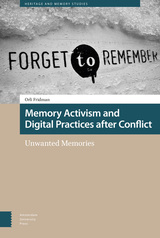
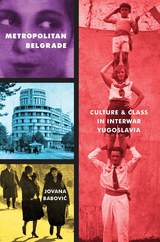
Metropolitan Belgrade presents a sociocultural history of the city as an entertainment mecca during the 1920s and 1930s. It unearths the ordinary and extraordinary leisure activities that captured the attention of urban residents and considers the broader role of popular culture in interwar society.
As the capital of the newly unified Yugoslavia, Belgrade became increasingly linked to transnational networks after World War I, as jazz, film, and cabaret streamed into the city from abroad during the early 1920s. Belgrade’s middle class residents readily consumed foreign popular culture as a symbol of their participation in European metropolitan modernity. The pleasures they derived from entertainment, however, stood at odds with their civic duty of promoting highbrow culture and nurturing the Serbian nation within the Yugoslav state.
Ultimately, middle-class Belgraders learned to reconcile their leisured indulgences by defining them as bourgeois refinement. But as they endowed foreign entertainment with higher cultural value, they marginalized Yugoslav performers and their lower-class patrons from urban life. Metropolitan Belgrade tells the story of the Europeanization of the capital’s middle class and how it led to spatial segregation, cultural stratification, and the destruction of the Yugoslav entertainment industry during the interwar years.
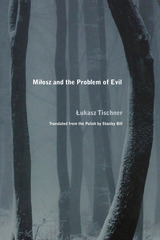
While scholars have chronicled Czesław Miłosz’s engagement with religious belief, no previous book-length treatment has focused on his struggles with theodicy in both poetry and thought. Miłosz wrestled with the problem of believing in a just God given the powerful evidence to the contrary in the natural world as he observed it and in the horrors of World War II and its aftermath in Poland. Rather than attempt to survey Miłosz’s vast oeuvre, Łukasz Tischner focuses on several key works—The Land of Ulro, The World, The Issa Valley, A Treatise on Morals, A Treatise on Poetry, and From the Rising of the Sun—carefully tracing the development of Miłosz’s moral arguments, especially in relation to the key texts that influenced him, among them the Bible, the Gnostic writings, and the works of Blake, Hegel, Kierkegaard, and Schopenhauer. The result is a book that examines Miłosz as both a thinker and an artist, shedding new light on all aspects of his oeuvre.
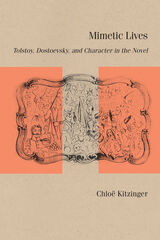
Through new readings of War and Peace, Anna Karenina, The Brothers Karamazov, and other novels, Kitzinger traces a productive tension between mimetic characterization and the author’s ambition to transform the reader. She shows how Tolstoy and Dostoevsky create lifelike characters and why the dream of carrying the illusion of “life” beyond the novel consistently fails. Mimetic Lives challenges the contemporary truism that novels educate us by providing enduring models for the perspectives of others, with whom we can then better empathize. Seen close, the realist novel’s power to create a world of compelling fictional persons underscores its resources as a form for thought and its limits as a direct source of spiritual, social, or political change.
Drawing on scholarship in Russian literary studies as well as the theory of the novel, Kitzinger’s lucid work of criticism will intrigue and challenge scholars working in both fields.
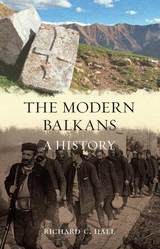
In The Modern Balkans, historian Richard C. Hall gives a complete account of the historical events that have shaped the Balkan region of Southeastern Europe. Originally separated from the rest of Europe by culture, politics, and economics, the Balkans have slowly been integrating into Western Europe since the nineteenth century. But this process of economic and political development, following the Western European model, has been far from smooth in the Balkans. As Hall explains, it has often been marked by violence and destruction, the result of many wars and rebellions. Though Soviet power imposed a nearly fifty-year peace in the region, the collapse of the Soviet Union renewed conflict that continued through the end of the twentieth century. Hall concentrates here on the significant political and economic events that have had the greatest impact on the role of the Balkans in Europe; in particular, he examines the development of national states in the nineteenth century, the influence of the two world wars, and the collapse of Yugoslavia.
This clear and concise history of the Balkan Peninsula will appeal to readers and scholars interested in European history and the Balkans’ unique role in it.
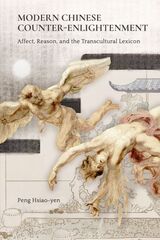
In Modern Chinese Counter-Enlightenment, Peng Hsiao-yen argues that a trend of Counter-Enlightenment had grown from the late Qing to the May Fourth era in the 1910s to the 1920s and continued to the 1940s. She demonstrates how Counter-Enlightenment was manifested with case studies such as Lu Xun’s writings in the late 1900s, the Aesthetic Education movement from the 1910s to 1920s, and the Science and Lifeview debate in the 1920s. During the period, the life philosophy movement, highlighting the epistemic debate on affect and reason, is connected with its counterparts in Germany, France, and Japan. The movement had a widespread and long-term impact on Chinese philosophy and literature. Using the transcultural lexicon as methodology, this book traces how the German term Lebensanschauung (life view), a key concept in Rudolf Eucken’s life philosophy, constituted a global tide of Counter-Enlightenment that influenced the thought of leading Chinese intellectuals in the Republican era. Peng contends that Chinese intellectuals’ transcultural connections with others in the philosophical pursuit of knowledge triggered China’s self-transformation. She successfully reconstructs the missing link in the Chinese theater of the worldwide dialectic of Enlightenment and Counter-Enlightenment.
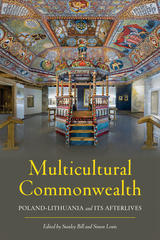
An Innovative Study on Historical Multiculturalism in Central and Eastern Europe
The Polish-Lithuanian Commonwealth (1569–1795) was once the largest country in Europe—a multicultural republic that was home to Belarusians, Germans, Jews, Lithuanians, Poles, Ruthenians, Tatars, Ukrainians, and other ethnic and religious groups. Although long since dissolved, the Commonwealth remains a rich resource for mythmaking in its descendent modern-day states, but also a source of contention between those with different understandings of its history. Multicultural Commonwealth brings together the expertise of world-renowned scholars in a range of disciplines to present perspectives on both the Commonwealth’s historical diversity and the memory of this diversity. With cutting-edge research on the intermeshed histories and memories of different ethnic and religious groups of the Commonwealth, this volume asks how various contemporary conceptions of multiculturalism can be applied to the region through a critical lens that also seeks to understand the past on its own terms.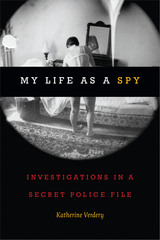
READERS
Browse our collection.
PUBLISHERS
See BiblioVault's publisher services.
STUDENT SERVICES
Files for college accessibility offices.
UChicago Accessibility Resources
home | accessibility | search | about | contact us
BiblioVault ® 2001 - 2024
The University of Chicago Press









